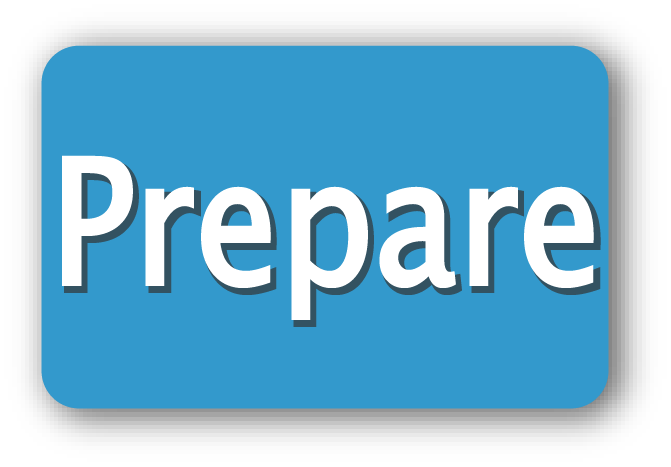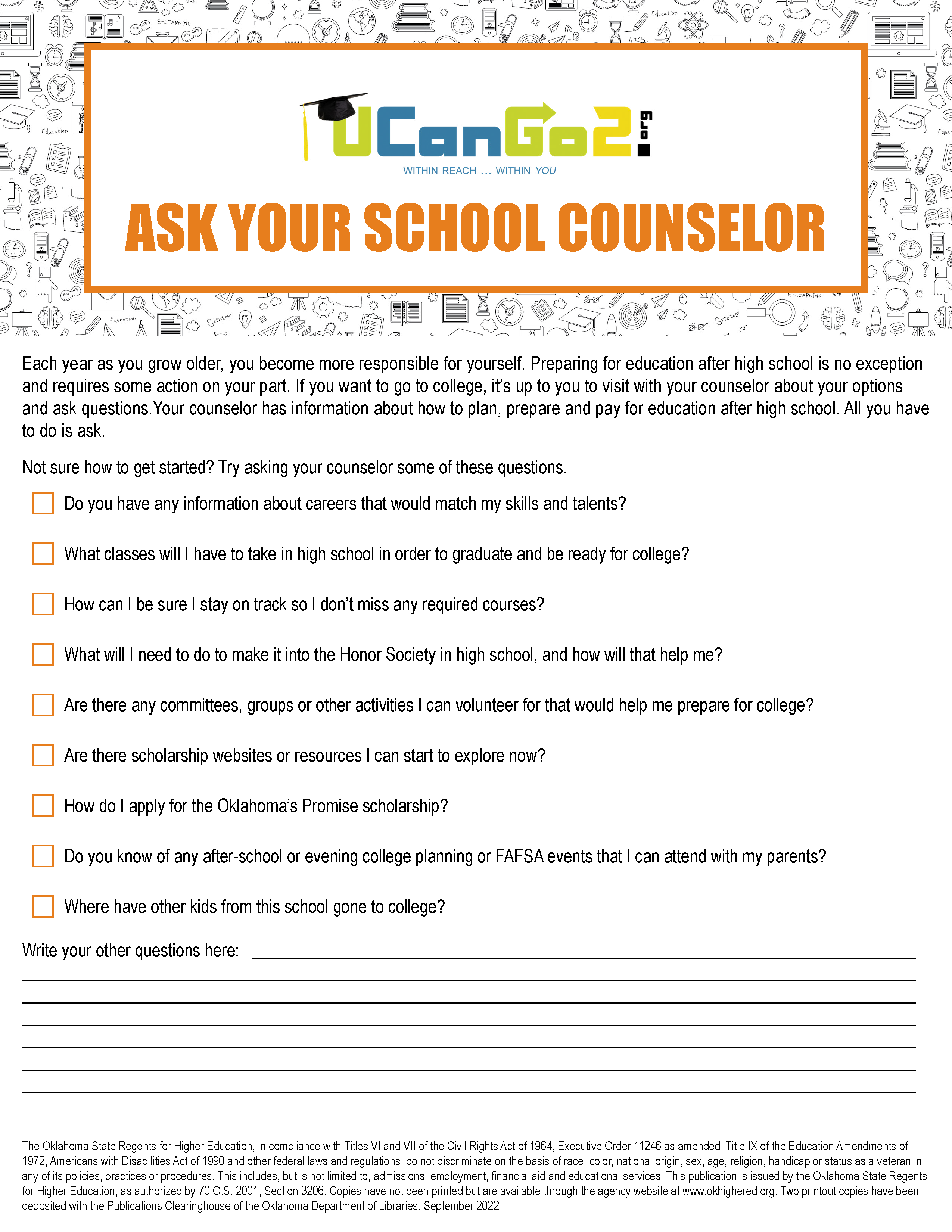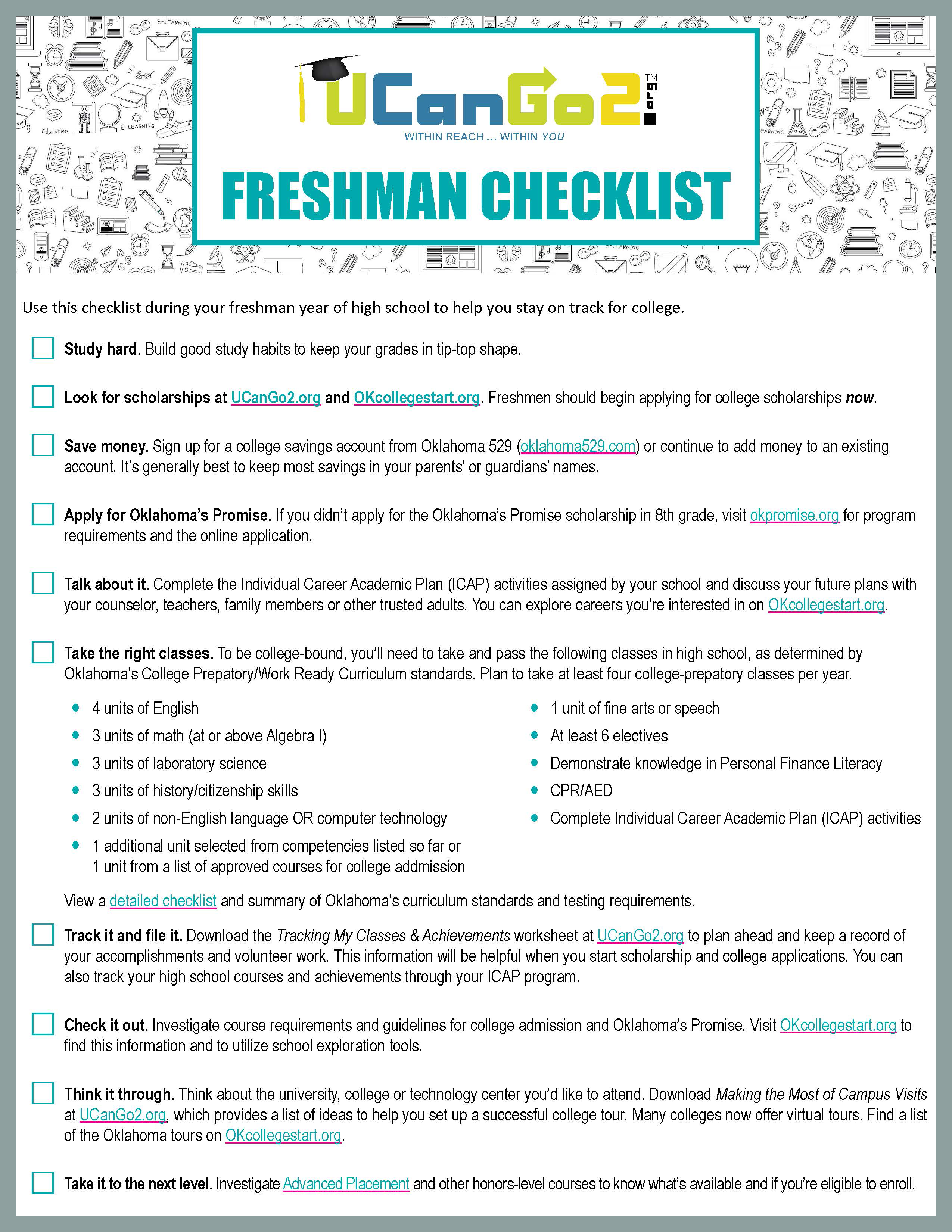Parents: Planning for College
Is College the Right Choice for Your Student?
No matter your child's circumstances—straight As or all Cs, first generation or third generation college student, rural or urban—with determination and effort, your child can attend a university, college or technical school and eventually have a great career.
Use the tabs below to learn about the meaning, value and benefits of a college education.
- What is College?
- What Are the Benefits?
- Addressing Concerns
- College Conversations
What is college?
The Merriam-Webster Dictionary defines college as:
col·lege
noun
: a school in the U.S. that you go to after high school : a school that offers courses leading to a degree (such as a bachelor's degree or an associate degree)
When we say "college," we mean all types of training after high school: technology centers, trade/proprietary schools, community colleges, regional and comprehensive universities.
Types of colleges in Oklahoma
There are different types of colleges and universities, and all types can be found in Oklahoma.
Next tab: "What Are the Benefits?"
What Are the Benefits?
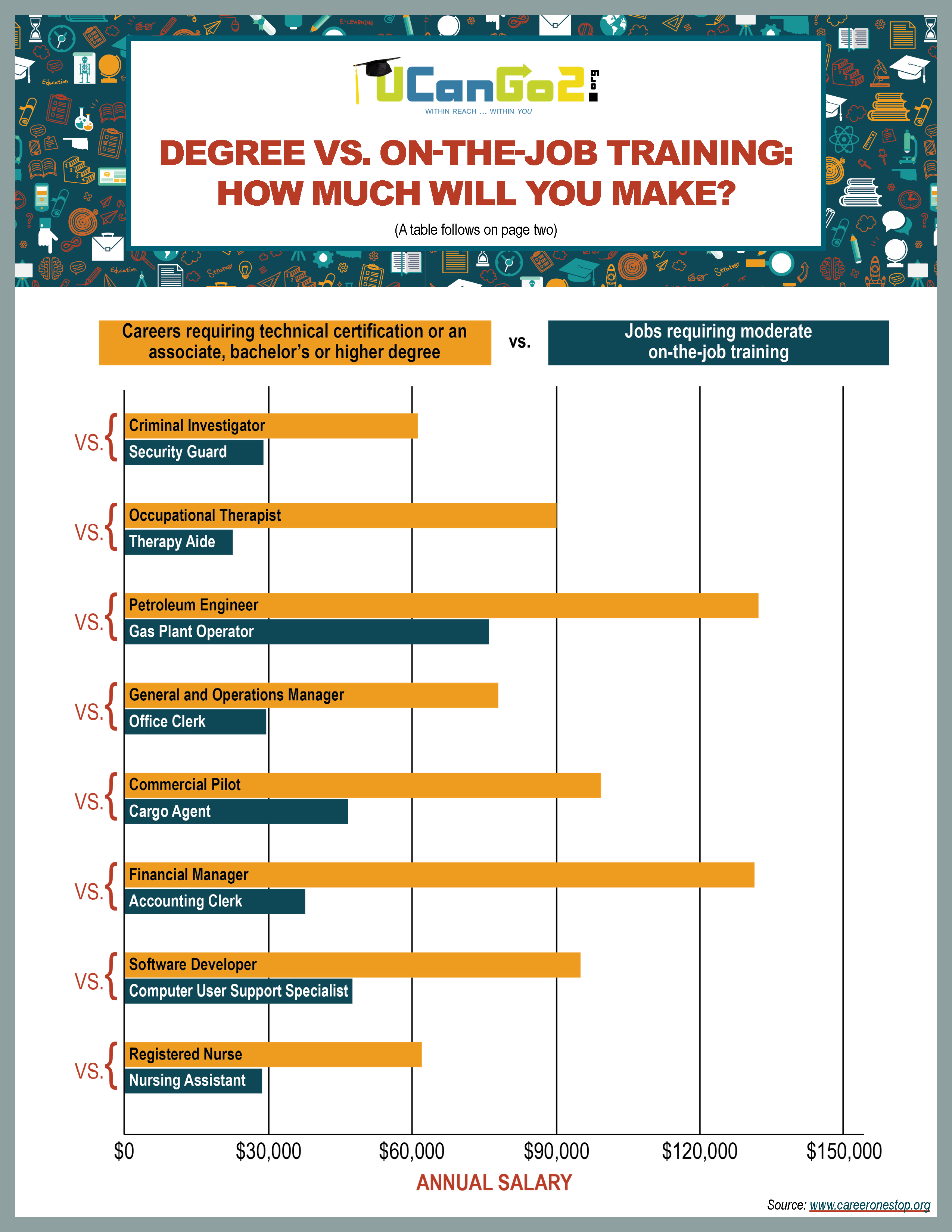 Higher Income — In general, those with some type of degree or certification earn significantly more than those with only a high school diploma. In fact, according to the College Board Advocacy and Policy Center, those with a bachelor's degree earn about 67 percent more than those with only a high school diploma.
Higher Income — In general, those with some type of degree or certification earn significantly more than those with only a high school diploma. In fact, according to the College Board Advocacy and Policy Center, those with a bachelor's degree earn about 67 percent more than those with only a high school diploma.
Still not convinced? Check out the Degree vs. On-the-Job Training Chart to compare salaries.
Job Satisfaction — College can give your child the freedom to choose classes and an interesting and pleasing career path. Students who choose a career in a field they care about are more likely to be satisfied with their everyday work.
Better Benefits — In addition to higher income and job satisfaction, a college degree can also help open the door for your child to a career with good health insurance coverage, paid vacation time, a retirement package and more.
More Job Security — With additional training after high school, your child is more likely to have, and keep, a job.
Next tab: "Addressing Concerns"
Previous tab: "What is College?"
Addressing Concerns
As a parent, you may have unique concerns regarding your child's future and education. Some parents have been planning for their child to go to college from the day their child was born. For some parents, sending their child to college can be worrisome. We've outlined a few common concerns below. Keep in mind, your concerns may be the same as your child's concerns. We encourage you to have an open and honest conversation about college with your child to help address everyone's concerns and alleviate worries.
Common Concerns:
- My child doesn't like school right now. How can I be sure my child will like college?
- My child doesn't have a career plan, so college would be a waste of time and money.
- College is too expensive. There's no way we can afford it.
- My child doesn't need a degree and can make more money by getting a job after high school.
- I didn't go to college. How will I be able to help my child succeed in college?
My child doesn't like school right now. How can I be sure my child will like college?
It's not uncommon for children to dislike school, but that shouldn't stop your child from considering college. College is much different! In college, your child will have choices in terms of campuses, classes, professors and extracurricular activities. For many students, college is a fresh start and new opportunity to discover who they are and who they want to become.
My child doesn't have a career plan, so college would be a waste of time and money.
Most college freshmen haven't decided on a major, let alone a career. College is an opportunity for your child to explore likes, dislikes and talents. By taking different types of classes and exploring new activities, students are often surprised by what they learn.
College is too expensive. There's no way we can afford it.
Oklahoma public colleges and universities are among the most affordable in the nation. College does cost in terms of tuition, books and time, but it's a smart investment in your child's future. Very few people get a full ride to college; that's why there's financial aid. Financial aid comes in many forms, including grants, scholarships, work-study and student loans. If getting an education is your child's goal, there are financial aid options to help along the way. Learn more about paying for college by clicking the green "Pay" button above.
My child doesn't need a degree and can make more money by getting a job after high school.
If your child is trying to choose between getting a job and getting a degree, keep in mind that a great deal of today's jobs prefer or require some form of degree or certification beyond a high school diploma. Click the "What Are the Benefits?" tab above to learn how a college education can help your child earn more money, better benefits and more.
I didn't go to college. How will I be able to help my child succeed in college?
If your child will be the first person to go to college in your family, you should know that many other families are in the same situation. While the prospect of college can be both scary and exciting, colleges are expertly staffed to help first-generation college students. College will help your child on the path to a bright future and may also become a source of pride for your family.
Next tab: "College Conversations"
Previous tab: "What Are the Benefits?"
College Conversations
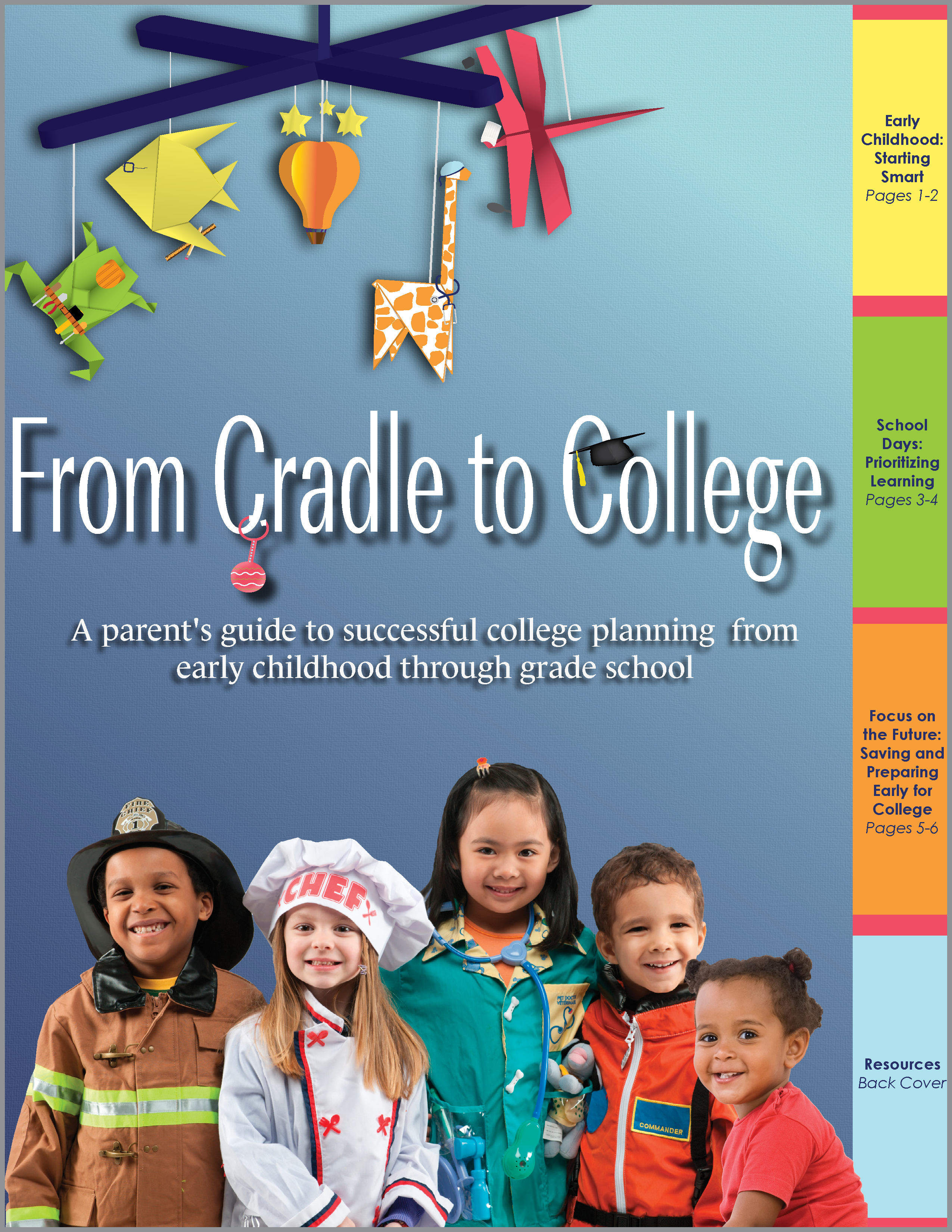 It’s never too early to start talking about college in the home, even if you weren’t able to go. Talking about college as a natural part of the education process will help make education after high school an expectation. Remember, children learn by example, so if you pursued education after high school, share that with your child. Even if your experiences weren’t always positive, talking about it can help your child learn from you.
It’s never too early to start talking about college in the home, even if you weren’t able to go. Talking about college as a natural part of the education process will help make education after high school an expectation. Remember, children learn by example, so if you pursued education after high school, share that with your child. Even if your experiences weren’t always positive, talking about it can help your child learn from you.
Below are a few do’s and don’ts for talking about college.
Do's
- Talk about the future and expect college to be a part of that future.
- Start saving money for college early and involve your child in the process.
- Use the words, “When you go to college,” making it both an aspiration and an expectation.
- Make sure your child is reaching developmental milestones and receiving health screenings to ensure there are no physical barriers to success.
- Visit local college campuses throughout childhood for sporting events and activities to make the campus a familiar setting for your child.
- Encourage your child to set goals and discuss the future. Help your child learn how to make a goal a reality.
- Ensure that homework is a priority in your home.
Don'ts
- Don't allow money to be a barrier to college. With all the higher education options and financial aid available, college can be a reality for most students.
- Don't talk about college as an option only available to people with certain academic abilities. Everyone is college material, and there is an option that matches everyone’s goals, needs and abilities.
- Don't doubt your child’s abilities. Your child can sense your doubts and feel them as his or her own.
- Don't discourage your child's dreams. Though being an actor or rock star may seem impractical or unobtainable now, these goals help children either learn how to achieve the impossible or learn how to set realistic goals.
To learn more about early college planning, check out our brochure for parents, From Cradle to College.
Previous tab: "Addressing Concerns"

